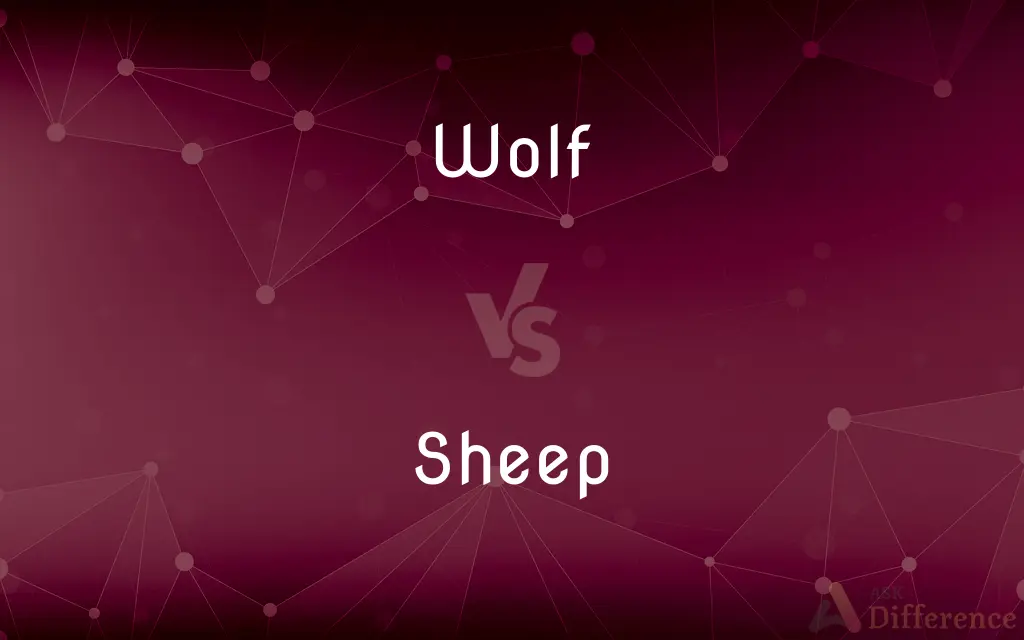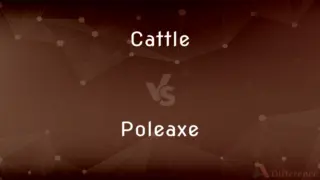Wolf vs. Sheep — What's the Difference?
By Fiza Rafique & Urooj Arif — Updated on March 26, 2024
Wolves are predatory carnivores known for their strength and pack behavior, while sheep are domesticated herbivores valued for wool and meat, displaying flocking behavior.

Difference Between Wolf and Sheep
Table of Contents
ADVERTISEMENT
Key Differences
Wolves are apex predators in their ecosystems, relying on a carnivorous diet that includes animals ranging from small rodents to large ungulates. Their hunting strategies are complex and often involve the cooperation of the pack, highlighting their social and intelligent nature. On the other hand, sheep are primarily domesticated animals raised for their wool, meat, and milk. They are herbivores that graze on grass and other vegetation, showcasing a more sedentary lifestyle compared to the nomadic and active lifestyle of wolves.
The social structure of wolves is organized around a pack, led by alpha male and female, emphasizing strong social bonds and a hierarchical order. This structure facilitates cooperative hunting and rearing of young, which are essential for their survival in the wild. Conversely, sheep display flocking behavior as a defense mechanism against predators, lacking the complex social hierarchy seen in wolves. Sheep rely on numbers and the protective guidance of a shepherd or herding dogs in domestic settings for safety.
Wolves have adapted to a wide range of habitats, from the Arctic tundra to forests and mountainous regions, showcasing their versatility and resilience. Their physical adaptations, such as powerful jaws, keen senses, and strong legs, enable them to hunt and thrive in various environments. Sheep, whereas, have been bred by humans to thrive in pastoral settings, with different breeds adapted to specific climates and terrains, but generally, they are more dependent on human intervention for their survival and comfort.
Reproduction in wolves is generally limited to the alpha pair to prevent overpopulation and ensure the pack's resources are not strained, highlighting their strategic survival mechanisms. Sheep have been selectively bred by humans to increase reproduction rates and optimize traits like wool quality and meat yield, reflecting human influence on their breeding and population management.
Despite their differences, both wolves and sheep have significant ecological and economic roles. Wolves play a crucial role in maintaining the health of ecosystems by controlling herbivore populations, which can prevent overgrazing and promote biodiversity. Sheep contribute to agriculture through the production of wool, meat, and milk, supporting human economies and lifestyles.
ADVERTISEMENT
Comparison Chart
Diet
Carnivorous, preys on various animals
Herbivorous, grazes on grass and vegetation
Social Structure
Lives in packs with a complex hierarchy
Lives in flocks, relies on numbers for defense
Habitat
Adaptable to a wide range of environments
Primarily pastoral, dependent on human management
Reproduction
Limited to the alpha pair in the wild
Selectively bred for higher reproduction rates
Role
Apex predator, maintains ecosystem balance
Domesticated for agricultural production (wool, meat, milk)
Compare with Definitions
Wolf
A carnivorous mammal known for its pack behavior and hunting skills.
The wolf pack coordinated their hunt at dawn.
Sheep
Dependent on human care for survival.
Sheep require shepherding for protection and guidance.
Wolf
Exhibits complex behaviors and intelligence.
Wolves use strategic tactics to ambush prey.
Sheep
A domesticated herbivore valued for wool and meat.
The sheep were sheared annually for their wool.
Wolf
Apex predators that play a key role in ecosystem balance.
The reintroduction of wolves helped control the deer population.
Sheep
Exhibits flocking behavior as a defense mechanism.
The sheep huddled together when threatened.
Wolf
Adapted to diverse habitats with strong social structures.
Wolves communicate using howls to maintain pack unity.
Sheep
Contributes significantly to agricultural economies.
Sheep farming is vital for producing wool and meat.
Wolf
Revered in various cultures for their symbolism.
In folklore, the wolf symbolizes courage and freedom.
Sheep
Bred selectively to enhance desirable traits.
The Merino sheep is prized for its fine wool.
Wolf
The wolf (Canis lupus), also known as the gray wolf or grey wolf, is a large canine native to Eurasia and North America. More than thirty subspecies of Canis lupus have been recognized, and gray wolves, as colloquially understood, comprise non-domestic/feral subspecies.
Sheep
Sheep (Ovis aries) are quadrupedal, ruminant mammals typically kept as livestock. Like all ruminants, sheep are members of the order Artiodactyla, the even-toed ungulates.
Wolf
Any of several carnivorous mammals of the genus Canis, especially the gray wolf of northern regions, that typically live and hunt in packs.
Sheep
A domesticated ruminant mammal (Ovis aries) having a thick coat, raised in many breeds for its wool, edible flesh, or hide.
Wolf
The fur of such an animal.
Sheep
Any of various wild ruminant mammals related to and resembling the domestic sheep, such as the aoudad, bighorn sheep, and mouflon.
Wolf
Any of various similar or related mammals, such as the hyena.
Sheep
Leather made from the skin of one of these animals.
Wolf
The destructive larva of any of various moths, beetles, or flies.
Sheep
A person regarded as timid, weak, or submissive.
Wolf
One that is regarded as predatory, rapacious, and fierce.
Sheep
One who is easily swayed or led.
Wolf
A harshness in some tones of a bowed stringed instrument produced by defective vibration.
Sheep
(countable) A woolly ruminant of the genus Ovis.
Wolf
Dissonance in perfect fifths on a keyboard instrument tuned to a system of unequal temperament.
Sheep
The domestic Ovies aries, the most well known species of Ovis.
Wolf
To eat greedily or voraciously:"The town's big shots were ... wolfing down the buffet"(Ralph Ellison).
Sheep
(countable) A timid, shy person who is easily led by others.
Wolf
Canis lupus; the largest wild member of the canine subfamily.
Sheep
A religious adherent, a member of a congregation or religious community (compare flock).
Wolf
Any of several related canines that resemble Canis lupus in appearance, especially those of the genus Canis.
Sheep
(uncountable) Sheepskin leather.
Wolf
A man who makes amorous advances to many women.
Sheep
A person who is easily understood by a speech recognition system; contrasted with goat.
Wolf
(music) A wolf tone or wolf note.
The soft violin solo was marred by persistent wolves.
Sheep
Any one of several species of ruminants of the genus Ovis, native of the higher mountains of both hemispheres, but most numerous in Asia.
Wolf
(figurative) Any very ravenous, rapacious, or destructive person or thing; especially, want; starvation.
They toiled hard to keep the wolf from the door.
The bee wolf
Sheep
A weak, bashful, silly fellow.
Wolf
One of the destructive, and usually hairy, larvae of several species of beetles and grain moths.
Sheep
Fig.: The people of God, as being under the government and protection of Christ, the great Shepherd.
Wolf
A white worm which infests granaries, the larva of Nemapogon granella, a tineid moth.
Sheep
Woolly usually horned ruminant mammal related to the goat
Wolf
A wolf spider.
Sheep
A timid defenseless simpleton who is readily preyed upon
Wolf
(obsolete) An eating ulcer or sore. See lupus.
Sheep
A docile and vulnerable person who would rather follow than make an independent decision;
His students followed him like sheep
Wolf
A willying machine, to cleanse wool or willow.
Wolf
(transitive) To devour; to gobble; to eat (something) voraciously.
Wolf
(intransitive) To hunt for wolves.
Wolf
Any one of several species of wild and savage carnivores belonging to the genus Canis and closely allied to the common dog. The best-known and most destructive species are the European wolf (Canis lupus), the American gray, or timber, wolf (Canis occidentalis), and the prairie wolf, or coyote. Wolves often hunt in packs, and may thus attack large animals and even man.
Wolf
One of the destructive, and usually hairy, larvæ of several species of beetles and grain moths; as, the bee wolf.
Wolf
Fig.: Any very ravenous, rapacious, or destructive person or thing; especially, want; starvation; as, they toiled hard to keep the wolf from the door.
Wolf
A white worm, or maggot, which infests granaries.
Wolf
An eating ulcer or sore. Cf. Lupus.
If God should send a cancer upon thy face, or a wolf into thy side.
Wolf
The harsh, howling sound of some of the chords on an organ or piano tuned by unequal temperament.
Wolf
A willying machine.
Wolf
Any of various predatory carnivorous canine mammals of North America and Eurasia that usually hunt in packs
Wolf
Austrian composer (1860-1903)
Wolf
German classical scholar who claimed that the Iliad and Odyssey were composed by several authors (1759-1824)
Wolf
A man who is aggressive in making amorous advances to women
Wolf
A cruelly rapacious person
Wolf
Eat hastily;
The teenager wolfed down the pizza
Common Curiosities
What distinguishes a wolf's diet from a sheep's?
Wolves are carnivores that hunt for prey, while sheep are herbivores that graze on vegetation.
What roles do sheep play in agriculture?
Sheep are raised for wool, meat, and sometimes milk, contributing to the textile and food industries.
Why are wolves considered apex predators?
Wolves are at the top of the food chain, with no natural predators, and play a crucial role in controlling prey populations and maintaining ecological balance.
Can wolves and sheep live in the same habitat?
While they can share habitats, wolves are predators that may prey on sheep, necessitating human measures to protect livestock.
What is the significance of the alpha wolf?
The alpha wolf leads the pack, making crucial decisions and maintaining order within the group.
What factors affect sheep farming practices?
Climate, breed characteristics, and market demand for wool and meat influence sheep farming practices.
How has domestication affected sheep?
Domestication has led to selective breeding of sheep for traits beneficial to humans, such as wool quality and meat yield, often at the expense of natural survival abilities.
Can wolves be domesticated like sheep?
Wolves have not been domesticated to the extent of sheep; they maintain their wild instincts and behaviors, making them unsuitable for domestic life.
Are wolves a threat to livestock?
Wolves can prey on livestock, including sheep, which is a concern for farmers and requires management strategies to protect animals.
How do wolves contribute to biodiversity?
By controlling herbivore populations, wolves help prevent overgrazing, supporting plant diversity and overall ecosystem health.
How do wolves and sheep socialize differently?
Wolves live in packs with complex social hierarchies, whereas sheep form flocks based on a simple grouping instinct for protection.
What adaptations help wolves survive in the wild?
Wolves have keen senses, physical strength, and social strategies that enable them to hunt effectively and adapt to various environments.
What ecological roles do wolves and sheep play?
Wolves help maintain ecological balance as predators, while sheep, through grazing, can impact plant communities and land use in agricultural settings.
How do humans influence the populations of wolves and sheep?
Humans control sheep populations through selective breeding and manage wolf populations through conservation efforts and, historically, culling.
Why do sheep exhibit flocking behavior?
Flocking is a defense mechanism against predators, where there is safety in numbers.
Share Your Discovery

Previous Comparison
Cattle vs. Poleaxe
Next Comparison
Superman vs. OvermanAuthor Spotlight
Written by
Fiza RafiqueFiza Rafique is a skilled content writer at AskDifference.com, where she meticulously refines and enhances written pieces. Drawing from her vast editorial expertise, Fiza ensures clarity, accuracy, and precision in every article. Passionate about language, she continually seeks to elevate the quality of content for readers worldwide.
Co-written by
Urooj ArifUrooj is a skilled content writer at Ask Difference, known for her exceptional ability to simplify complex topics into engaging and informative content. With a passion for research and a flair for clear, concise writing, she consistently delivers articles that resonate with our diverse audience.
















































